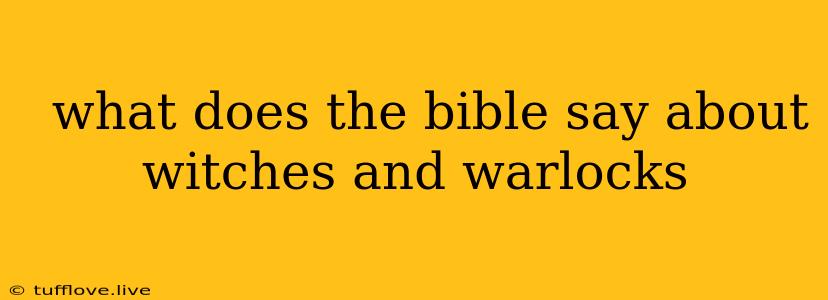The Bible, a foundational text for Christianity, offers a complex and often misunderstood perspective on the concepts of witches and warlocks. While these terms do not appear explicitly in the original Hebrew and Greek texts, certain passages and themes provide insights into ancient beliefs surrounding magic, sorcery, and those associated with such practices. Interpreting these passages requires careful consideration of historical context, cultural understanding, and the evolution of religious thought over time.
Witchcraft and Sorcery in the Old Testament
The Old Testament provides several references to witchcraft and sorcery, often associating them with pagan practices that were condemned by the Israelites. These references highlight a distinction between the monotheistic God of Israel and the polytheistic gods worshipped by neighboring cultures.
Forbidden Practices
The Book of Exodus (22:18) explicitly condemns the practice of witchcraft: "Thou shalt not suffer a witch to live." This verse, however, is open to interpretation. Some scholars argue that it refers specifically to those who practiced divination or necromancy (communicating with the dead), while others suggest it encompasses a broader range of magical practices deemed harmful or threatening.
Other passages like Deuteronomy 18:10-12 similarly condemn divination, sorcery, and necromancy, associating them with practices that are "an abomination to the Lord." These prohibitions likely stemmed from the Israelites' desire to maintain a clear separation between their own religious beliefs and the pagan practices of surrounding cultures.
The Witch of Endor
One of the most famous and controversial accounts involving a "witch" appears in 1 Samuel 28:3-25. King Saul, facing a desperate battle against the Philistines, seeks out a woman known as the "witch of Endor" to summon the spirit of the prophet Samuel. The witch, despite claiming to have fear of the king's potential retribution, performs the ritual and Samuel appears. While the text does not explicitly condemn the witch for her actions, it does highlight the dangers of seeking knowledge or power through supernatural means.
The Nature of Witchcraft
It's important to recognize that the Old Testament does not explicitly define what constitutes a "witch" or a "warlock." Instead, it focuses on the dangers of practices deemed harmful or associated with pagan religions. The term "witch" is often translated from the Hebrew word "mekhesheph," which can also be interpreted as "enchanter" or "sorcerer," highlighting the broader context of magic and divination.
Witchcraft in the New Testament
The New Testament, while primarily focused on the teachings of Jesus Christ, also offers glimpses into beliefs surrounding witchcraft. However, unlike the Old Testament, it does not condemn witchcraft with the same severity.
Demons and Exorcism
The New Testament frequently mentions the presence of demonic forces, which are associated with sickness, suffering, and spiritual oppression. Jesus and his disciples are depicted performing exorcisms, casting out demons that are often attributed to witchcraft or sorcery. For example, in Mark 9:25, a demon-possessed boy is described as being "deaf and dumb" because of the "evil spirit" that possessed him.
A More Nuanced Perspective
While the New Testament acknowledges the existence of spiritual forces that can inflict harm, it emphasizes the power of faith and prayer to overcome such forces. The book of Acts 19:19, for example, recounts a story where individuals burned their magical books after encountering the power of the Christian message. This suggests that the early Christians viewed the practice of witchcraft as a threat to their faith, but also acknowledged the possibility of individuals turning away from such practices through faith.
The Emphasis on Love
Ultimately, the New Testament message centers on love, forgiveness, and reconciliation. While recognizing the existence of spiritual forces that can cause harm, it emphasizes the power of love to overcome evil. This perspective aligns with the teachings of Jesus, who emphasized the importance of love and compassion for all people.
Understanding the Bible's Perspective on Witches and Warlocks
The Bible's perspective on witches and warlocks is not one of simple condemnation. It reflects the complex beliefs and practices of ancient societies, including the dangers of engaging in practices that were considered to be harmful or associated with pagan religions. However, it also emphasizes the power of faith and love to overcome evil, suggesting a more nuanced and multifaceted understanding of the spiritual world.
It's essential to approach these passages with historical sensitivity, recognizing the cultural context in which they were written. While the Bible provides insights into the beliefs and practices of ancient times, it's important to engage in critical analysis and consider the broader context of spiritual and religious beliefs. Understanding these nuances can help us better understand the complexities of the Bible's perspective on witches and warlocks, and its enduring message of hope and redemption.
